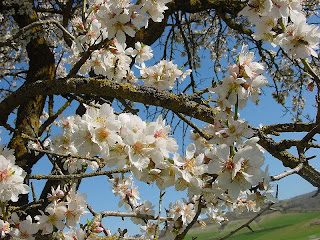Tu B'Shevat (the 15th day of the month of Shevat) is one of four Jewish New Years. Its purpose is to establish a method of calculating the age of trees in order to follow the Torah prescription that the fruit of a tree is not to be eaten in the first three years. In the fourth year, it is holy, and in the fifth year, it may be eaten "that it may yield its increase to you."
In 2011, the holiday occurs on January 20th (beginning at sunset on the 19th).

Since it would be next to impossible to keep records of the "birth date" of each and every tree in a large orchard, Tu B'Shevat was established as the day on which all trees add another year to their ages. In this way, it is often thought of as the birthday for trees! If a tree was planted the day before Tu B'Shevat, it becomes one year old on that date; if planted the day after, it waits a year to become one year old.
 Customs in celebrating this holiday include planting trees, eating dried fruits and nuts, especially those grown in the land of Israel, including figs, dates, raisins, carob, and almonds. In the Middle Ages, a seder was developed for the holiday, following a similar pattern to the Pesach (Passover) Seder.
Customs in celebrating this holiday include planting trees, eating dried fruits and nuts, especially those grown in the land of Israel, including figs, dates, raisins, carob, and almonds. In the Middle Ages, a seder was developed for the holiday, following a similar pattern to the Pesach (Passover) Seder.
In Israel, the flowering of the almond trees coincides with Tu B'Shevat, and although the holiday occurs during January or February, cold months in North America, in Israel the sap is beginning to rise in the trees at about the time of this holiday.

Human beings are often compared to trees in the scriptures. Just a few examples follow:
For man is a tree of the field.
That person is a like a tree planted by streams of water, which yields its fruit in its season and whose leaf does not wither--whatever that person does prospers.
But I am like an olive tree flourishing in the house of God. I trust in God's unfailing love forever and ever.
The righteous will flourish like a palm tree; they will grow like a cedar of Lebanon.

The fruit of the righteous is a tree of life, and the one who is wise saves lives.
Like an apple tree among the trees of the field is my beloved among the young men; I delight to sit in his shade, and his fruit is sweet to my taste.

Linguistic Note. Tu is not an actual word. It is the pronunciation of the two Hebrew letters Tet and Vav, which are used to represent the number 15 (Tet has a value of 9 and Vav has a value of 6, the sum of which is 15. Normally the letters Yud and Hei would be used, but since Yud Hei spells the shortened form (Yah) of the Tetragrammaton, it may not be used for such a mundane purpose as marking a date.)



































